Using Urine in Compost (What It Does + How to Do It Safely)
Wondering if urine is good for compost? Learn when peeing on compost helps, when it doesn’t, and how to do it safely.
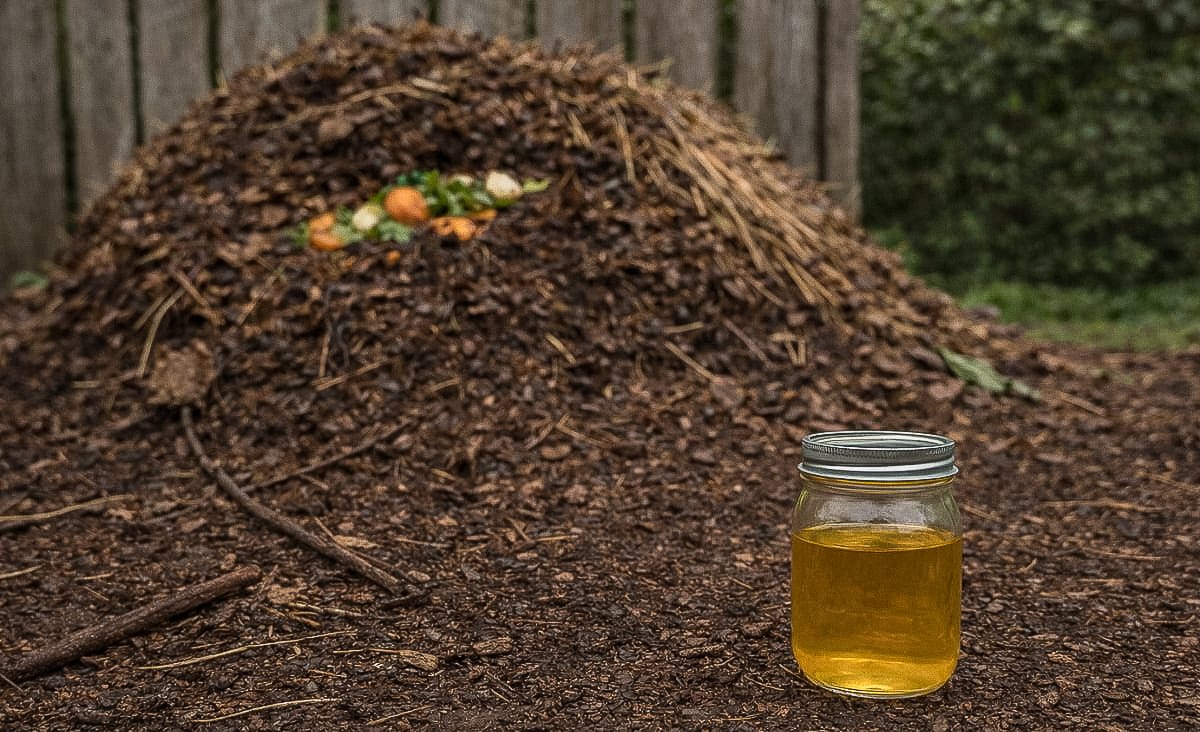
Some of my ideas make my family roll their eyes, but this one definitely takes the cake. I asked them to help me pee in the compost pile. The boys were delighted (of course). My daughter? Not so much. But every drop counts, and truth be told, the garden’s never complained. And the results kind of speak for themselves.
If you’ve ever wondered whether peeing in your compost is genius or gross, let’s talk about it. Here’s why ‘peecycling’ might be one of the most underrated garden practices out there and how to do it the right way.
Why Urine Works So Well in Compost
Gardeners spend good money on nitrogen fertilizers, but there’s a free, natural source we all produce daily… urine. Fresh human urine is rich in nitrogen, phosphorus, and potassium (the same nutrients listed on fertilizer labels as N-P-K). Basically, it’s free fertilizer your body makes every single day.
If you’ve ever wondered what nitrogen actually does in the soil, I’ve got a whole post about it here.
When added to compost, those nutrients:
- Give the compost microbes a major energy boost
- Balance out all those dry “browns” like leaves and straw
- The end result? Dark, rich compost your plants can actually use right away.
According to a study National Geographic mentioned, one person makes enough ‘liquid gold’ each year to fertilize all the food they’d eat. Wild, right? That’s a lot of potential fertilizer going down the drain.
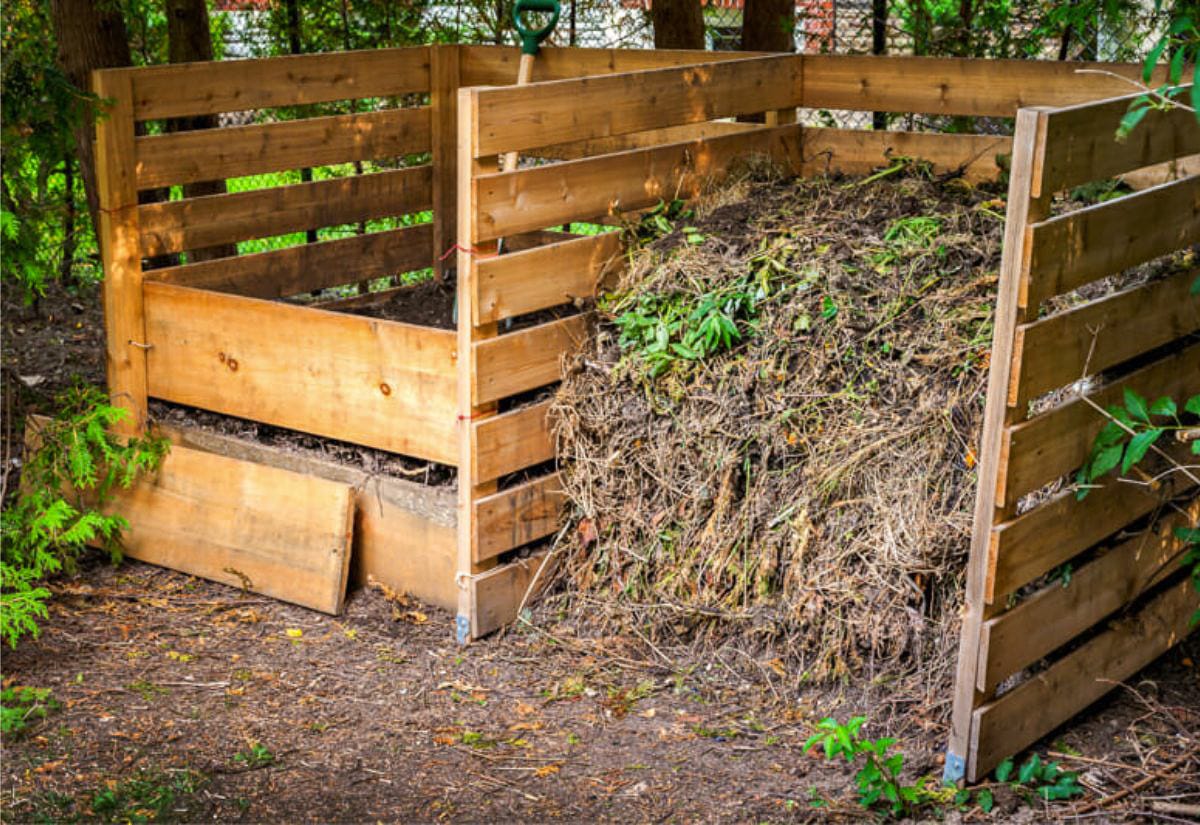
How to Use Urine in Compost (Safely and Effectively)
You don’t need anything fancy for this, just a good aim and a little common sense. Here’s what’s worked for me over the years.
Use it Fresh
Urine starts breaking down quickly, so it’s best added soon after collection. If you need to store it, keep it sealed and use within a few days.
Dilute for Direct Application
If you’re adding it directly to soil or plants, mix 1 part urine to 10 parts water. Too strong, and you risk burning plants. Compost, however, can handle urine full-strength.
Target the Browns
Compost piles that are heavy on “browns” (leaves, straw, cardboard) benefit most. That little boost of nitrogen wakes the pile right up and keeps it from drying out.
Add Gradually
Add it in slowly as you build layers. That way everything breaks down evenly and you won’t get that strong ammonia smell.
Keep it Discreet and Balanced
If the smell bugs you (or your neighbors), just toss on a handful of leaves or straw after each ‘donation.’ If you’re working in a small space, keep things low-key with an enclosed composting bins (especially if you’ve got close neighbors).
Winter composting slows down microbial activity, but urine can still help keep the pile moist and active. In freezing climates, I’ll sometimes collect and store a little in early spring to jumpstart new compost piles.
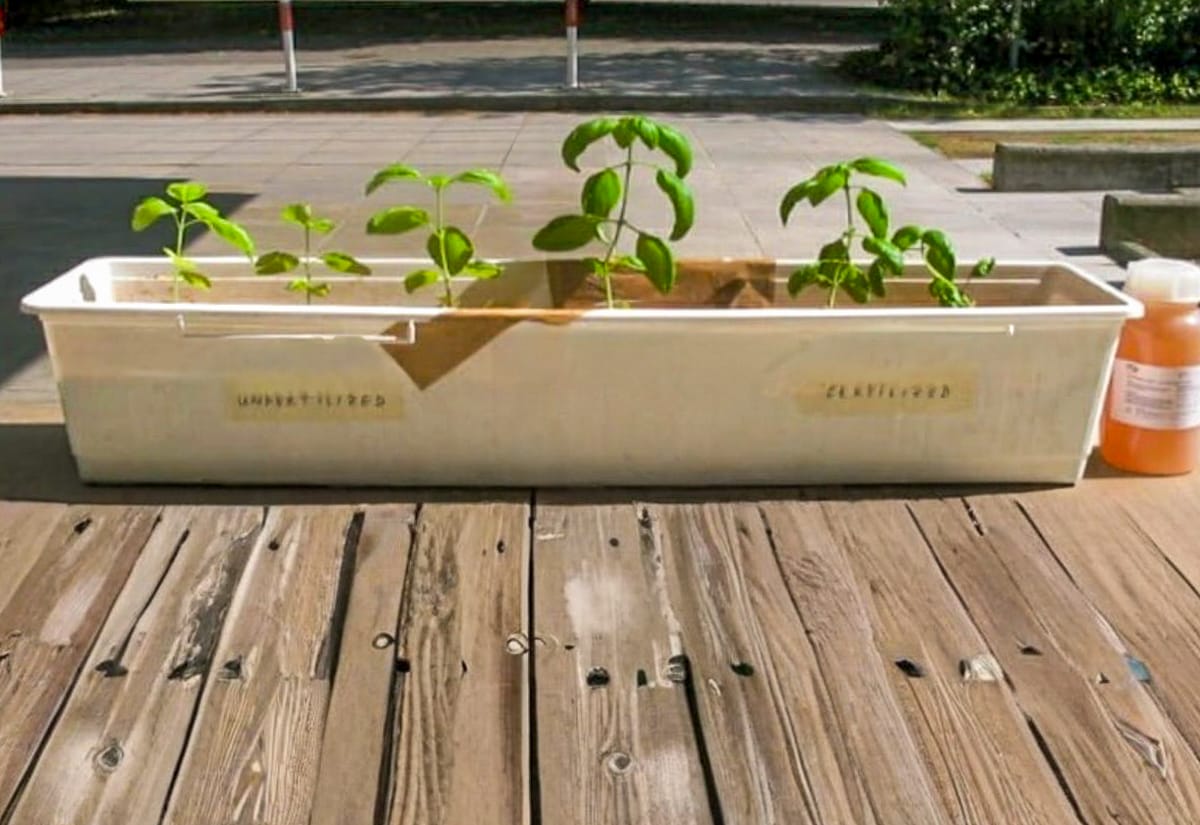
What About Using Urine Directly in the Garden?
You can! But dilution is key. Use the 10:1 ratio and water it in well. I use it mostly on fruit trees, ornamentals, and my heavy-feeding veggie beds. It soaks in quick, and the plants don’t seem to mind one bit.
Avoid applying to edible leaves (like lettuce or spinach), just to play it safe. Let soil microbes and time do the cleaning.
Is Urine Safe for Compost?
For healthy individuals, yes. Fresh urine is sterile when it leaves the body. The only real concern is if someone’s on medication or lots of supplements. Some of that can end up in their urine, but not enough to stress about.
That’s why I stick to using urine from people in my own household (a perk of knowing exactly what everyone’s taking). Most studies say it’s not something to worry about once it’s composted, but I still like to play it safe.
When in doubt, use it for ornamental plants or non-edible compost piles.
Does It Really Work? (What I’ve Noticed Over Time)
After years of adding urine to our compost, I can tell you it works. The pile heats up faster, breaks down better, and the finished compost feels… different. Softer. Almost silky between your fingers.
If you’re the curious type, grab a compost thermometer. You’ll actually see how much heat your ‘liquid gold’ adds.
Urine’s just one of the tricks I use. Mix it with other natural soil boosters, and your soil will thank you. When I’ve skipped it for a while, the difference shows. The pile takes longer to decompose and tends to dry out, especially during summer. A little ‘liquid gold’ goes a long way.
Tips for Success (and Avoiding Weird Looks)
Want to make peecycling a bit more practical? Here’s what’s worked for me and kept the family from complaining too much.
- Use carbon-rich cover material (leaves, straw, sawdust) to mask any odor.
- Keep a dedicated spot for it—one section of your compost pile or a smaller bin just for urine-treated waste.
- Don’t overdo it. Too much nitrogen can create an ammonia smell or slimy texture. If that happens, just add more browns.
- Stay practical: If peeing outside isn’t an option, you can collect urine in a wide-mouth container or jar and add it during your composting routine.
Honestly, once you see how fast your pile finishes, you’ll forget why it ever sounded weird. Around here, it’s just part of the routine now.
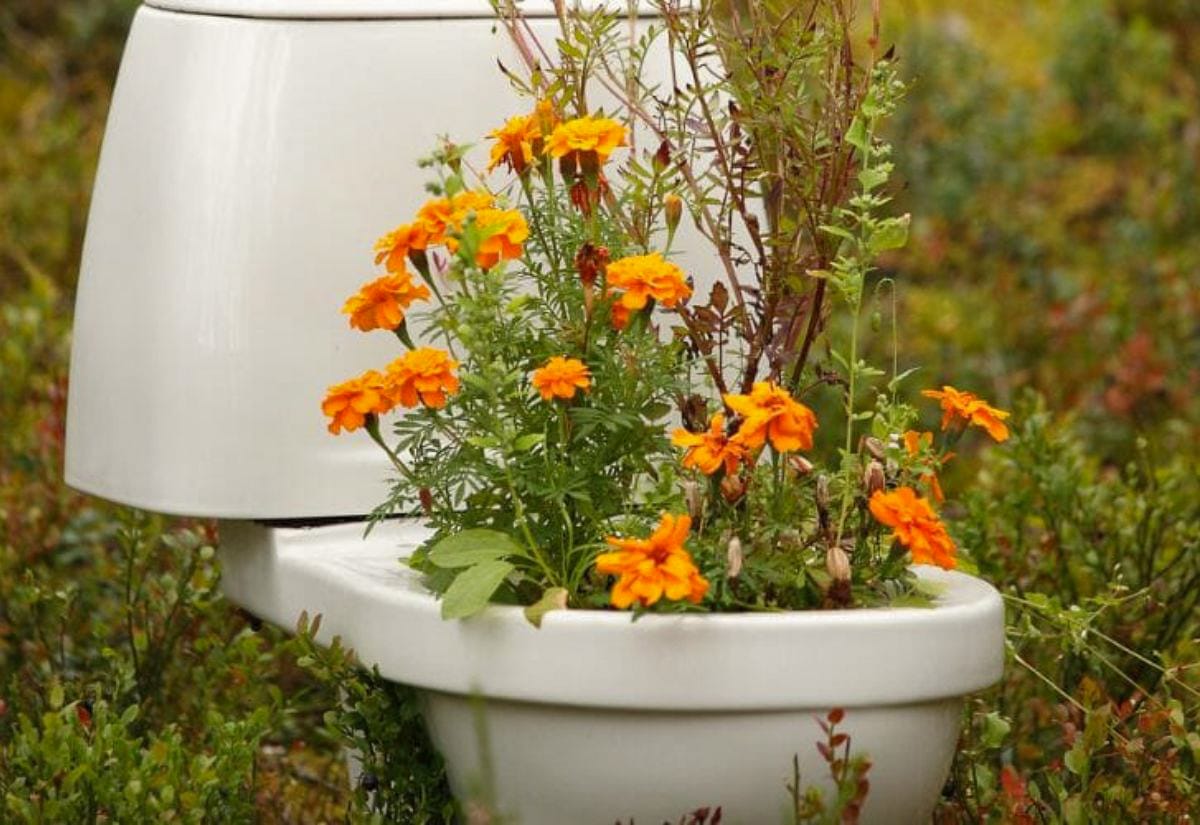
Everything You’re Curious (but Maybe a Little Hesitant) to Ask
I know, this topic brings up a lot of “but what about…” questions. Let’s tackle the big ones.
Some Bathroom Reading Material (I couldn’t help myself)
If you want to dig deeper into the science (and maybe laugh a little while you’re at it), these are worth a read.
Liquid Gold: The Lore and Logic of Using Urine to Grow Plants by Carol Steinfeld
The Humanure Handbook by Joseph Jenkins (included in Kindle Unlimited)
Thinking about giving ‘liquid gold’ a try? Save this post on Pinterest so it’s easy to find when you’re ready to test it out.
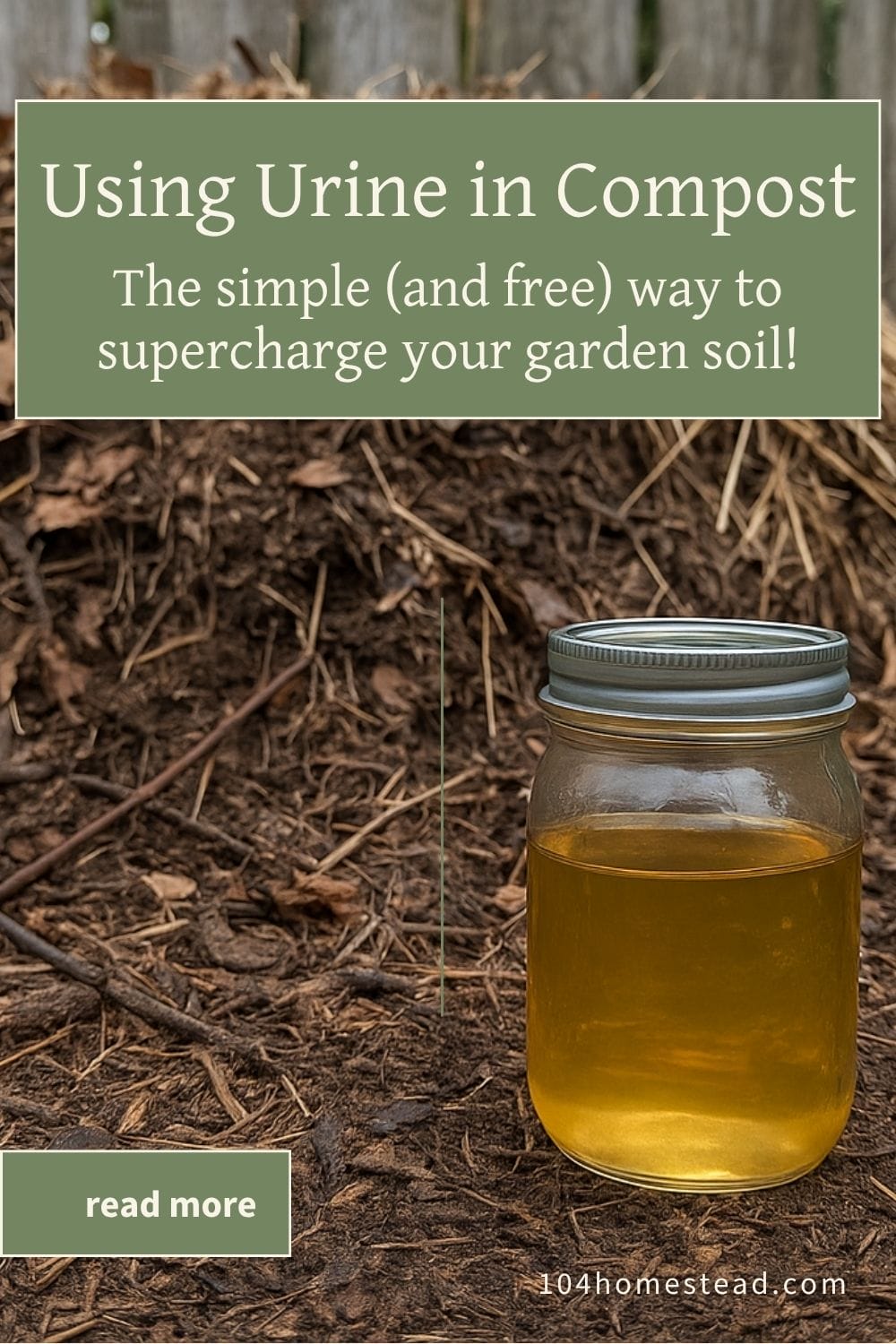
Urine might be one of the most underappreciated tools on the homestead. It’s free, it’s renewable, and your garden will absolutely love it. Once you get past the awkward factor, you’ll wonder why you didn’t start sooner.
Once that compost is ready, spread it over tired and depleted soil and watch things come back to life. It’s simple, free, and a little bit funny when you think about where it started.
So go ahead, join the peecycling revolution. Your compost pile (and your harvest) will thank you.
And if you want to know what else you can toss into your compost bin, check out my full guide on what you can and can’t compost on your homestead.

Can you comment on the use of cat litter in the compost. Two adult cats create a lot of waste, and I was wondering if I could add it to the compost successfully.
Hey there! It’s really not advisable to compost cat litter. Cat feces is loaded with pathogens you do not want getting in your food, especially if you have young, old, or pregnant people in your family. It’s best to dispose of cat litter at the transfer station. I know, it’s annoying. I hate doing it as well.
Makes sense! Thank you for sharing.
A plastic gallon windshield wash bottle works great for a man. (A gallon vinegar bottle is almost as good) Store it under the bathroom toilet tank. It’s the right height to use if you set it on the toilet bowl lid. I fill 3 of these before dumping on the compost pile. If the odor offends in the bathroom, add a bit of vinegar. In the summer, I store filled bottles in the garage. In the winter, I store in the basement ( it can freeze in the garage). It’s easy and it saves water and fertilizer. I feel guilty when I forget to use the bottle and revert to my old ways.
I have 2 acre garden in the United States that employs the homeless and helps them re-establish their lives. I am much older than the people I see here, but I have always been an alternative thinker. I think peeing in the compost pile will be a fun exercise for my homeless friends. It will give them a new purpose and perspective on peeing outside.
Thank you for your humorous post . It’s great to see common sense meeting the science .
First I’ve noted that my dogs urine was burning the grass only to have it come back stronger and greener after good dozen of rains . Just like a ( organic )fertilizer only too concentrated .
Than I watched a video about this old and famous eco biologist ( can’t find the link now) where he revealed how our entire planet mass desertification can be stoped and reversed by roaming herds of livestock and predators , free to munch and excrete like thousands years back.
Simple genius of God’s creation , isn’t it ?
I now have a small backyard garden that needs help . “That’s gonna be fun , kids “ ???
I live in the UK and have quite a small garden. The summer before last I dug and hole in the garden and spent all winter filling it with household kitchen waste, newspapers, cardboard and layers of soil (to keep the smell down). During this time I frequently urinated into the hole. In the spring I planted tomatoes. After a good crop I dug out the hole and what I found astounded me, it was the most amazing compost I’d ever seen – it was beautiful. So I thought maybe urine is good so each day I have urinated into a bucket and watered it down 20 or 30 to 1 and then throw it on the lawn. Although we are now into the autumn the lawn has never looked so healthy. Suffice to say I am now filling an even deeper hole in the garden and yes, it getting a healthy dose of urine.
I have begun using gdiaper inserts and want to compost the pee pee ones (website claim C2C and biodegradable), have your tried anything like this?
They had just come out when my youngest was born. I thought they were a really cool idea, but baby’s bum was too sensitive for them. I don’t think I did compost them when I tried them, but I’d probably be willing to give it a try (you know, if I still had a baby in diaper).
I used pee last year on my hay bails to break them down, I kept check on the temp for 12 days and it worked
I’m glad it worked so well for you. Certainly cheaper than store bought fertilizers and compost activators.
ive heard of peeing around the garden to ward off the critters but this is new to me ,,learn something new everyday
I already pee in the back yard frequently. I just have to change the location. Also every time I do not have to flush a toilet. Yeehah saves on the water bill and the carbon footprint.
Great Article. Peeing in the garden also deters moles.
I save the leaves from dozens of trees each fall and pile them into a bin. I save my urine in the garage all winter and add it to the pile in spring. Each day I add a bit to it. Come each fall again I have the best, richest compost you can imagine… all for free.
Anytime I am in my greenhouse in which I use fish to provide fertilizer for my plants, I pee in the fish tank. Why do you think they call it aq-pee-ponics?
Well that’s a great method. I’m not sure *I* have the coordination for that, but I applaud you for doing so.
I suggest reading “The Humanure Handbook”. A great read that opened my eyes.
Good reason to throw a kegger party, everyone line up to pee in the compost!
Oh this is great and definitely something I’m going to have to remember. I’m thinking my urine would not be acceptable as I take several medications to deal with medical issues, but I might be able to convince my very healthy nephews…. it is after all for the good of the garden 😉
Thanks for sharing.
Can you do this with worm composting?
I haven’t tried it. I’m thinking I’d abstain from adding undiluted urine to your worm bin.
no, it isn’t good to pee on your worm bed. If you do second stage composting (removing the worms and further composting) you could pee on that pile with benefits.
Great, now all my friends will feel they are “contributing” to my compost when we sit around the outdoor fire and drink a few beers 🙂
I’m so happy I could help Mike Lol.
My son-in-law’s buddies tend to pee in the far corner of the backyard (at night) instead of coming into the house to use the toilet. It has always driven me crazy! I’m not sure whether I can convince them to pee in the compost pile on the other side of the garden or not, but I’ll think about it! Either way, this gave me a giggle! – Fawn
Maybe a men’s restroom sign will guide them that way 😉
Love it! I don’t think my teenage boys wills do it but maybe my grandson 😉
Great article! I’ve read about urine collection and the breakdown of ammonia to nitrates for gardening & fertilizer, but have never made the connection to just pee in the compost. All this time I’ve been peeing in the yard, I now have a mission and purpose for my urine! I love it, thank you!
I’m so glad I’ve given your urine proper direction LOL!
I always say that getting caught urinating on compost is Decent Exposure.
Love it! And it’s great hearing from you stranger 🙂
You’re so blessed! My son refuses to pee outside unless he’s bursting and we’re in the middle of nowhere. He’s not much of an outdoor personality and value his modesty – type 2 energy/blue on the color code thing. Anyway, may you enjoy great success with them demonstrating their love for you and their garden! 🙂
Yeah, my boys could use a bit more modesty in their lives. My older boy needs to be reminded to face away from the street and my toddler is a practicing nudest.